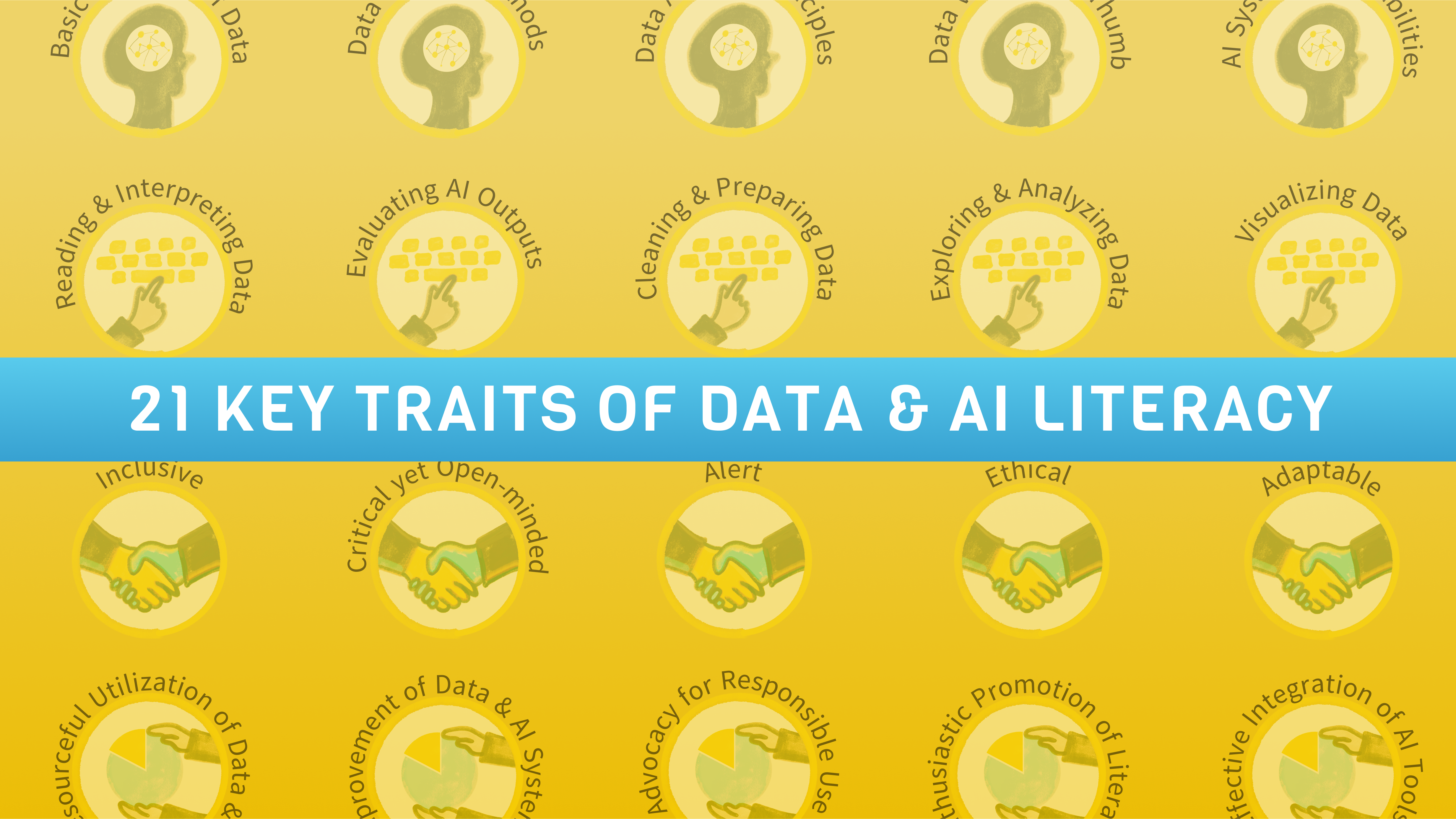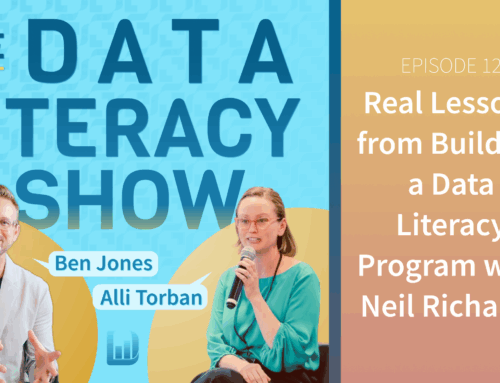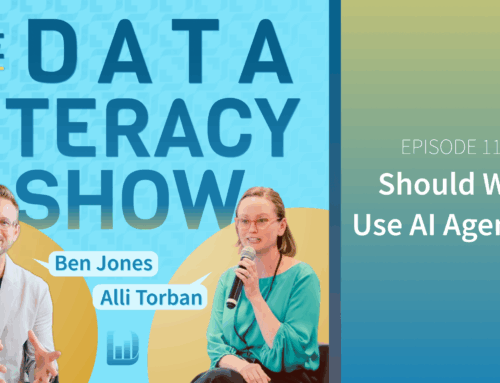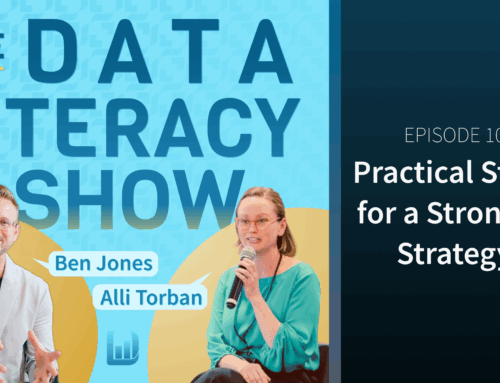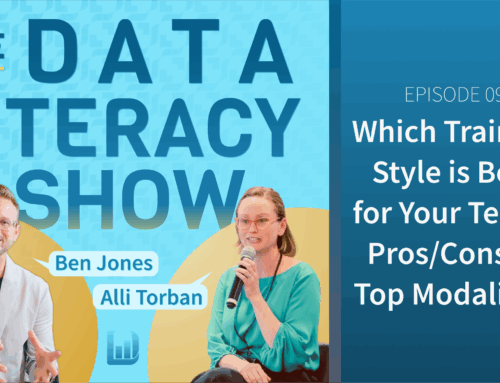Episode 02: The 3 Most Overlooked Traits of Data Literacy
Listen on Spotify, Apple Podcasts, YouTube, or wherever you get your podcasts!
Topics we cover:
- Why adaptability is a must-have mindset in today’s fast-changing data landscape (PwC’s latest Global Workforce Hopes and Fears Survey)
- How a culture of continuous improvement leads to better data quality and decision-making
- The AI knowledge gap—why understanding AI systems and capabilities is now essential (Americans Use AI in Everyday Products Without Realizing It)
Ben and Alli share real-world examples of how these traits show up in the workplace, plus insights from the 21 Key Traits of Data & AI Literacy self-assessment.
Subscribe now to never miss an episode, and let’s make data accessible for everyone!
What is the 21 Key Traits of Data and AI Literacy self-assessment?
This course helps professionals and teams assess their data and AI literacy, identify key growth areas, and develop essential knowledge, skills, attitudes, and behaviors for success. Learners receive a digital copy of 21 Key Traits of Data & AI Literacy, four core video lessons, a self-assessment worksheet, 60+ curated resources, and five real-world case studies. Whether you’re a business leader, analyst, or data-driven professional, this program provides practical tools to evaluate your strengths, prioritize relevant skills, and build confidence in working with data and AI.
TRANSCRIPT:
Alli Torban: [00:00:00] Hello, welcome to the Data Literacy Show, the podcast that helps organizations build, measure, and level up their data and AI literacy.
Ben Jones: Hi, everyone. I’m Ben Jones, co founder and CEO of Data Literacy. And what we’re all about, of course, is helping people learn the language of data and AI. We have tailored training courses and assessments that help them do that.
Alli Torban: Yes, and I am Alli Torban, Senior Data Literacy Advocate here at Data Literacy. And today we are sharing the key traits of data and AI literacy that you should be looking to cultivate in yourself or maybe for those on your team. And these traits aren’t only things that you should know, they’re also skills, attitudes, and behaviors.
And we actually have a self assessment that is called the 21 key traits of data in AI literacy or data literacy. And we’ve noticed that the traits that people don’t spend a lot of time developing are [00:01:00] specifically those in the attitude and behavior categories.
Ben Jones: If you’re interested in assessing yourself in all 21 traits and seeing it graphed out in a nice scatterplot to see which traits are your strengths and which you have maybe the opportunity to develop going forward, then you can hop on over to dataliteracy.
com. But today on the show, we want to highlight for you three commonly overlooked traits. These are the ones that you might not think of. first, but that actually might make a huge impact.
Alli Torban: Yeah. Yeah. And I love those small, yet really important details that sometimes you can miss. And when I think of important traits for someone who has high data in AI literacy, I’m definitely thinking about the knowledge and the skills like the tools, the softwares, the techniques, but that’s just the obvious.
stuff. There’s more behind that. Sometimes
Ben Jones: we call them those hard skills or very technical skills. And that’s again, the starting point. That’s what we think about. That’s what we focus on. But [00:02:00] if you think about it, we’ve all worked with, let’s say a toxic high performer, right? Sometimes also called a brilliant jerk
Alli Torban: or a brilliant bully.
I’ve heard that one. I like
Ben Jones: that better. That’s probably better. Yeah. Yeah. So this is a person, Hey, they have tons of knowledge. Okay. But they also have. Maybe a really bad attitude. What happens is they apply that knowledge in a way that’s actually detrimental to the team. I’m actually thinking of a person I once worked with, who knew the ERP system at our company.
It was SAP, but they knew it inside and out. Now, what they did was they hoarded all that knowledge to themselves to try to protect their own career instead of maybe sharing it for the benefit of all. Or more recently, you can think about this phrase we’ve heard a lot of lately called Quiet quitting.
If you think about it that’s a situation where a person might have incredible skills, let’s say maybe in data and AI. They just choose for one reason or another not to actually use those skills. In [00:03:00] some cases, maybe not at all. So if what you want to do is build a team with true data and AI literacy, you need to go beyond knowledge and skills.
Those are important, yes, but you need to go beyond that. and then also embrace attitudes and behaviors. So maybe thinking about those as like the four points of a compass.
Alli Torban: Yeah, you can’t just think about the knowledge and the skills. You really do need to think about the whole compass, the attitudes and behaviors.
So let’s get to the good part. The, what is the first trait we see organizations are often overlooking, but is actually really important.
Ben Jones: Yeah. So let’s start with the attitudes category. I think this one is becoming so important now, even more and more. Every year that goes by but it’s adaptability now.
Think about this as a person. What are they doing? They’re embracing the Quickly evolving nature of technologies. They’re also maybe, maintaining a growth mindset They’re willing to dive in and continuously learn new tools and approaches [00:04:00] as this crazy field develops. Yeah. And they’re looking for an understanding really that, things can change very fast.
So I’m gonna have to adapt and be on the lookout maybe for some new things to develop as time goes along.
Alli Torban: Yeah, and I was thinking, what are things people could ask themselves to assess their adaptability? Because if you said, hey, are you adaptable? I’m like, I don’t know.
Ben Jones: Sure.
Alli Torban: You could be thinking about are you willing to learn new things or new tools, new softwares?
If you are actively seeking out opportunities to expand your skills or knowledge. Or, how willing are you to help other people on your team to learn new things as well?
Ben Jones: Yeah, exactly. Think of a specific skill that you acquired in the last year. Think of a new tool that you went ahead and Looked into, took a class on, tried out.
If you can think of a few of those things, that’s a good clue. Maybe adaptability is something that’s one of your strengths. If you’re relying on the tried and true [00:05:00] and only going back to those same old approaches and such while other people are talking about new ways of doing that and that feels intimidating to you and you’re shying away from that, then, you might need to lean into adaptability a bit.
And I would say this spans, all aspects of work. It isn’t really just about data and AI. So you know, you could maybe learn to be adaptable working in a different environment or working with different people. Adaptability is very broad, but I do think it applies specifically to data and AI because of how fast things are moving.
So therefore I would say, cultivating that adaptable attitude, super, super important, but often overlooked.
Alli Torban: Yeah. Yeah. I actually found this stat in PwC’s survey called the Global Workforce Hope and Fear Survey. And it said that half of the workers that they surveyed feel that there’s too much change at work happening at once.
And with AI I definitely understand that. And 44 percent said they don’t understand why things need to change at all. So you can see how adaptability, having that [00:06:00] trait is something that can really help you stand out in your work.
Ben Jones: Yeah. This is like this resistance to change, why are we doing this?
Why do things need to be different? They were working just fine. I think it’s a really common attitude. I could even say maybe I’ve had that attitude from time to time. But yeah, the situation we’re in today is that, so much is changing right now and that change again can be really hard for some people.
So if you have that adaptable attitude. Then you can keep moving and excelling in your role. And here’s one way to think about it. Okay. So if actual literacy like reading a book that’s going to involve the language and being able to read that language, but when it comes to data literacy. The language of the book we’re trying to read just keeps changing.
So we’re adding new words, taking out old ones, even maybe shifting around some grammatical rules left and right. So human language does change over time too, but the language of data is changing at a much, much faster rate. So that’s why to me [00:07:00] adaptability has become really a core trait for a person you want to hire on your team that’s going to be highly data and AI literate.
Alli Torban: Yeah. I agree with that. Now, the second most overlooked trait in our humble opinions is continuous improvement of data and systems. And this is actually in the behavior category. So what does this one mean, Ben?
Ben Jones: Yeah. So attitudes, that’s about your mindset behaviors. That’s about what you can be counted on to do week in and week out.
So behaviors, it all comes down to that really in the end. So continuous improvement. Continuous improvement. I’ve actually spent a lot of time in my career focusing on that. Being in Lean Sigma previously and trying to just find processes and improve them and save the company money. And I think we can apply that mindset to data and AI.
And I think it actually will make a huge difference. Think about whether you’re continuously identifying and implementing improvements, okay, in the data quality. In your analysis methods, and even, in the AI [00:08:00] applications themselves. Let’s give a scenario here. Maybe you’re having trouble finding a data set.
This is really common, we hear this a lot. Okay, you do that work, you uncover it, you find it, you have that kind of. Moment where you realize there’s data there and you get your hands on it and you’re so excited But then you look at it and you realize wait a second. It’s got a lot of issues with it, maybe there’s some inconsistencies some inaccuracies maybe there’s a lot of nulls or typos So you do all this kind of grunt work to clean it all up.
And then what do you do? Do you just use it or keep it on your desktop? Or, what are you doing with the output of all of that? A lot of people would. They would just use it and move on. But, I think this trait we’re looking for here, that’s the person that says, wait a minute, I’m going to go back, circle back, close the loop with the data owner and say to them, this data was very hard for me to find.
Here’s some way where it might be easier for others. Also, here are some data quality issues, here’s how I fix them, here’s how you might put in place some improvements in the system itself to prevent those [00:09:00] kinds of data quality issues from surfacing down the road. So what are you doing? You’re making it easier for the next person
Alli Torban: to
Ben Jones: find and actually use that data.
Alli Torban: Yeah. Yeah. And this is a really underrated trait. I remember when I first started working, I was a government contractor and I was trying to fix this issue in production and I needed to run a SQL query and I didn’t know what was the right SQL query to run. And I was like searching through SharePoint, trying to figure it out.
And it’s a high pressure situation. And I came across this folder where the person who had my position in the past. Actually had written up all the common SQL queries and with screenshots and comments. And it was just like, wow, I cannot believe that this person took the time to do this.
It is making my job so much easier. And I remember talking to the person next to me and I was like, I can’t believe she did this. And he was like she was a great analyst. Of course she would do that. I’m like, oh I guess that’s what great analysts do.
Ben Jones: [00:10:00] Yeah, and it’s, that becomes like systemic knowledge, right?
It becomes baked in, but in that case you’re talking about, there was some hidden folder, who knows what it was named. Maybe it would have been really hard for you to go about finding what it’s called. What can you do to, again, just continuously improve this whole system? I think this trait, what is this going to do?
It’s going to improve the experience of everyone on the team. Yeah. If you think of data, okay, let’s say it’s one of your team’s greatest assets. Most people would probably agree with that statement. Then, what happens if you have a group of people that are constantly finding ways to make it better? So then the value of that asset just keeps going up and up over time.
Alli Torban: Yeah, like a flywheel, right? Yeah, that’s amazing. Yeah, that one’s definitely overlooked for sure and valuable. Now, our last trait that is overlooked is AI systems and capabilities, which is actually in the knowledge category. Yeah,
Ben Jones: So we’ll go back to knowledge here. You say, Oh, I thought this was about attitudes and behaviors.
Sure, that’s why we started with that. But we also need to realize that there are [00:11:00] some major gaps in our knowledge and major gaps in our skill sets. So what’s so interesting about AI is that many people have misconceptions about what it is and what it isn’t. So if we focus on that right now. There is this one I think we just really need to call out, and that is that if you take the knowledge of even what are basic types of AI systems, most people probably think about just chat GPT.
I think a lot of people probably do. And yeah, large language models are a big part of. The AI world and umbrella, but so are, so as computer vision systems, predictive models, we’re talking about translation capabilities we can go on and on about all of the different types of AI systems.
Okay. So there is this Gallup poll. We’ve got to talk about this. It came out last month. Here’s what it showed. [00:12:00] Now they asked Americans. Did you use one of these seven AI enabled products? So think about streaming services like Netflix, or maybe a weather app, or a social media platform, or Alexa or Siri or another personal virtual assistant.
Now, half of the people who said, Yes, I have used five or six of those products. Half of them thought that they hadn’t used an AI product at all in the last week. And another 37 percent who used three or four, who said that they used three or four, they also said, I don’t think I’ve used any AI enabled products in the past week.
They didn’t even
Alli Torban: know they were using it.
Ben Jones: Yeah, they were using the products. And they didn’t know they were AI powered products. They just simply didn’t know. So I think that there’s that problem in the workforce, too. I think if you say to yourself how is my organization using AI today? [00:13:00] You might be surprised in, of all the various ways you, not only your organization is, but has been for a lot of time now using different technologies that fall under the umbrella of AI.
Alli Torban: Yeah. Yeah. I would have thought, yeah, Siri and Alexa definitely use AI, but now thinking about social media and weather apps, it’s really integrating, being integrated into. So many things, so it’s really important for us to know what it is, what are the different technologies how they’re used so we can understand how it’s affecting our technologies and what we’re using it for.
Ben Jones: Yeah. I think we gotta know. We gotta know what it is and how we’re using it to even really be able to take advantage of it. That seems like it’s core. So it seems surprisingly, maybe there’s more of a gap there in the knowledge category and trait than probably many people were aware of.
Alli Torban: Yeah, that is a, that does seem like a really huge gap, a knowledge gap that we need to fill. That’s a really important trait for someone who has high data [00:14:00] and AI literacy. And AI is really taking over and being integrated in so many things. And so that. That helped us understand that we really needed to adjust these key traits and we actually added a few of these traits that are specifically AI related to our 21 key traits.
What are those three ones, Ben? Yeah,
Ben Jones: exactly. It used to be the 17 key traits of data literacy. Now it’s a 21 key traits of data and AI literacy. So we’re evolving. The product itself and such, that one about, knowing about AI systems and capabilities, that’s one, but there’s another one which is really focusing on evaluating AI outputs.
So being able to identify when an AI output might be incorrect or biased or figuring out how to adjust, whether we can use it or not, right? Kind of assessing. Reliability and limitations of AI outputs. That’s so important nowadays. And going along with that would be [00:15:00] The skill of being able to effectively integrate AI tools into your own workflow.
So identifying an appropriate use case, figuring out how to make that happen. And then we’ve also expanded some of them. So for example, we used to have just resourceful utilization of data. We’ve expanded that to be resourceful utilization of data and AI. Any of the resourcefulness component, this is in the behaviors category.
We have those four categories, knowledge, skills, attitudes, behaviors we talked about. So one of the behaviors is being resourceful, being able to seek out data sources or AI systems that we can apply to our work, being able to combine some different traditional and AI powered tools to solve some problems, again, and doing so in a resourceful way.
Because. We might have limited time, we might have limited budget in some cases that would lead some people to just throw up their hands and maybe give up, but a resourceful individual and a team of resourceful individuals, they’re going to figure that part of it out that’s really going to contribute, to [00:16:00] the overall team data and AI literacy.
Alli Torban: Yeah. You want to use this amazing technologies that we have to help with your project. Okay. So let’s do a quick recap. Today we covered the three most overlooked traits of data and AI literacy, according to us, which are adaptable, continuous improvement of data and systems and AI systems and capabilities.
And we also shared some emerging traits we should be focusing on to increase our AI literacy.
Ben Jones: Yeah and if you’re curious about the full list of traits and you want to go through that self assessment for yourself or your team, check out the show notes. There’s a link in there to this course and an e book that goes with it.
It’s pretty quick. You can actually take it in under an hour. It’s been just recently refreshed with brand new videos and content and we have Also learning resources for each of the traits, which ones you’ve determined you really have as a growth opportunity. So tons of resources, so you can know exactly what to do next to just really improve and pump up any of those traits that you need to work on going [00:17:00] forward.
Alli Torban: Yes. And thanks for tuning into the Data Literacy Show. If you found this episode helpful!

